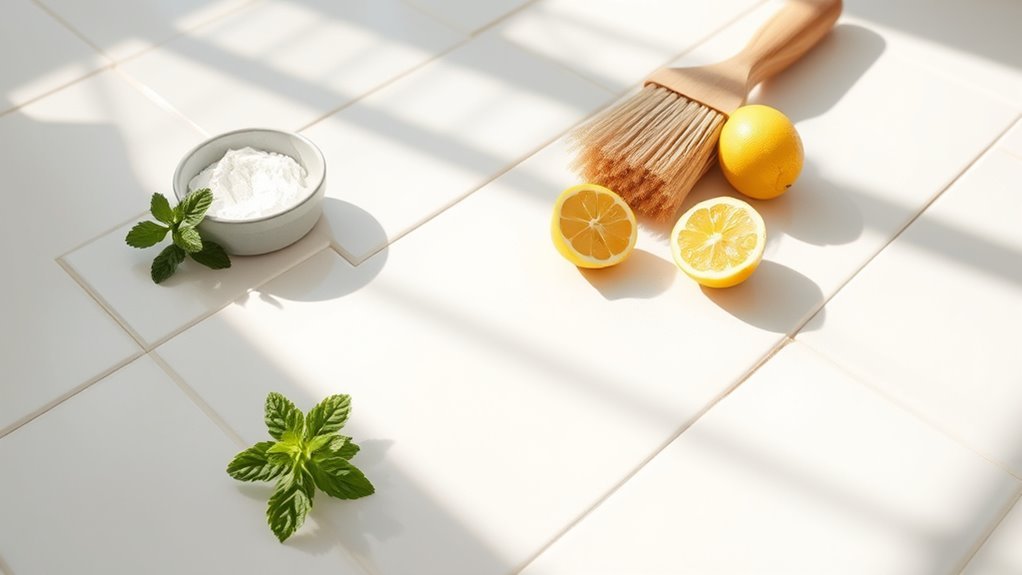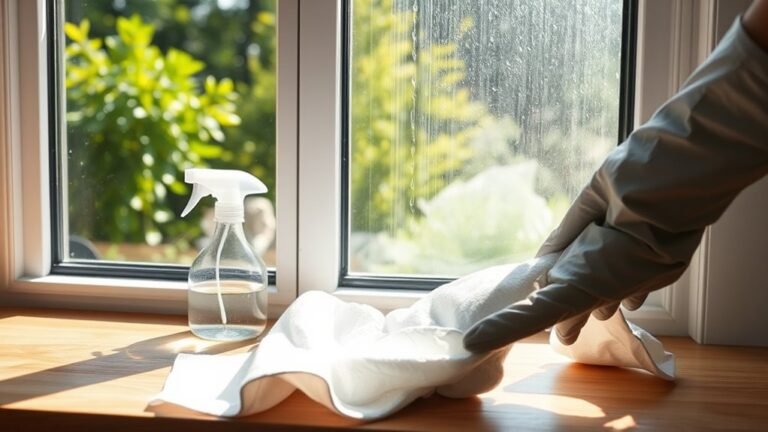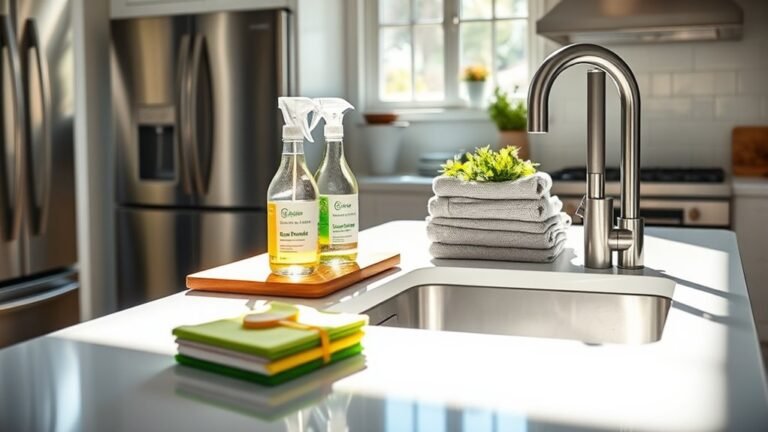Natural Cleaning Hacks for Your Tile
You can keep your tiles spotless using natural ingredients like a vinegar-and-water mix for everyday cleaning, and a baking soda paste to tackle grout stains. Lemon juice breaks down soap scum, while hydrogen peroxide disinfects deeply without harsh chemicals. For a shiny finish, try olive oil with essential oils. Gentle Castile soap and steam cleaning also work wonders. Plus, natural solutions help prevent mold and mildew, making your tiles last longer. Discover even more easy, eco-friendly tile care tips ahead.
Using Vinegar and Water for a Basic Tile Cleaner
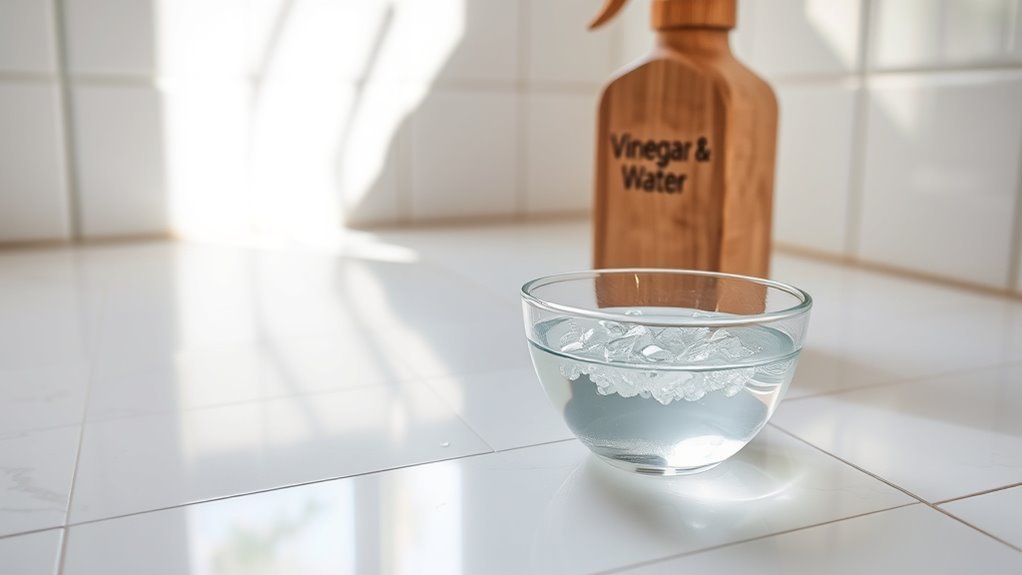
Although commercial cleaners can be effective, you might find that a simple mixture of vinegar and water is just as powerful for cleaning tile. The vinegar benefits are impressive—it naturally cuts through dirt, grime, and soap scum without harsh chemicals. To get the best results, stick to the right water ratios: a 1:1 mix of white vinegar and water works well for most tile surfaces, giving you a balanced cleaner that’s tough on stains but gentle enough to protect your tiles. This solution lets you reclaim control of your cleaning routine, avoiding unnecessary toxins and embracing a more natural approach. Just spray, wipe, and enjoy the freedom of a sparkling clean floor without the fuss.
Baking Soda Paste for Grout Stain Removal
You can easily make a baking soda paste by mixing baking soda with a little water until it forms a thick consistency. Apply this paste directly onto grout stains, covering them completely. Let it sit for a few minutes before scrubbing to lift the dirt effectively.
Making Baking Soda Paste
When tackling grout stains, making a baking soda paste is a simple and effective solution you can prepare at home. Baking soda benefits include its gentle abrasiveness and natural deodorizing power, making it perfect for revitalizing grout without harsh chemicals. To get the right paste consistency, mix baking soda with just enough water to form a spreadable, thick paste. Here’s how you can make it quickly:
- Start with ½ cup of baking soda for a good base.
- Add water slowly, about 2-3 tablespoons, until you reach a creamy, spreadable texture.
- Stir well to avoid lumps and guarantee even application.
This DIY paste lets you take control of your cleaning routine, keeping your tiles bright and grout fresh while embracing a natural, hassle-free approach.
Applying Paste on Grout
Now that you’ve prepared your baking soda paste, it’s time to apply it directly onto the grout stains. Use a small spatula or your fingers to spread the paste evenly over the grout lines, ensuring full coverage. Let it sit for 10 to 15 minutes to loosen dirt and stains. Next, grab your grout brush and start scrubbing using circular motions—this is one of the most effective grout brush techniques to lift grime without damaging your tiles. Remember, homemade grout recipes like this one give you control over what touches your home, freeing you from harsh chemicals. After scrubbing, rinse with warm water and wipe away residue. Repeat if necessary, and enjoy your naturally refreshed grout without sacrificing your desire for a clean, toxin-free space.
Lemon Juice to Eliminate Soap Scum
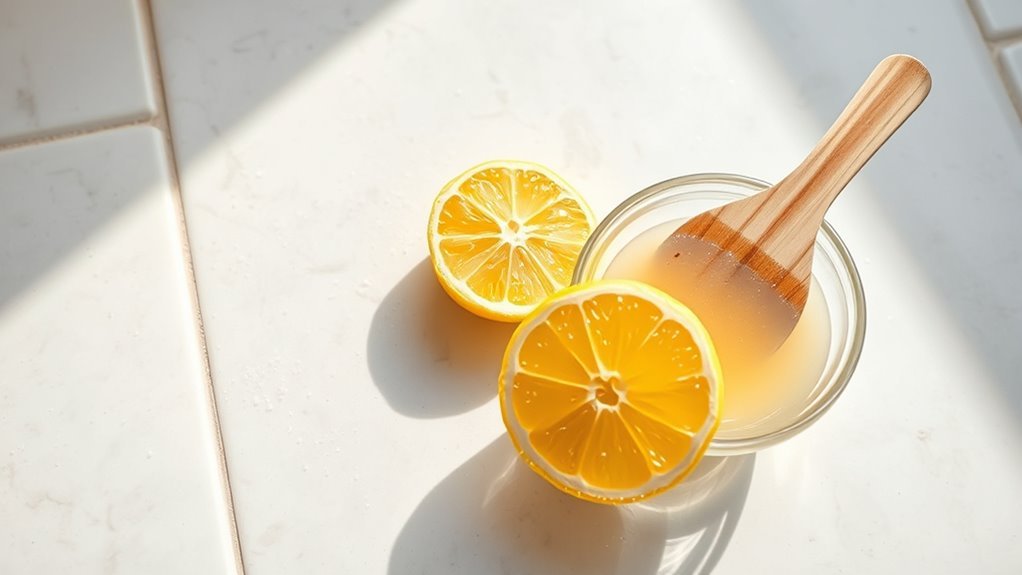
Anyone who’s dealt with soap scum on tile knows how stubborn it can be, but lemon juice offers a natural, effective way to break it down. Thanks to lemon benefits like natural acidity and antibacterial properties, you can tackle soap scum without harsh chemicals. Here’s how to use lemon juice for a fresh, clean shine:
- Squeeze fresh lemon juice directly onto the affected tile areas.
- Let it sit for 5–10 minutes to loosen soap scum buildup.
- Scrub gently with a soft brush or cloth, then rinse with warm water.
Hydrogen Peroxide for Deep Cleaning and Disinfection
Hydrogen peroxide is a powerful, natural cleaner that’s perfect for deep cleaning and disinfecting tile surfaces. When you want to break free from harsh chemicals yet keep your space spotless, hydrogen peroxide steps up. Simply apply it directly to grout lines or tile, let it sit for a few minutes, then scrub and rinse. It targets stubborn stains and kills bacteria, giving you peace of mind without toxic residues. Plus, it’s affordable and easy to find. Using hydrogen peroxide for disinfecting surfaces means you’re choosing a safer, eco-friendly option that doesn’t compromise on effectiveness. Embrace this simple hack to maintain your tiles’ cleanliness and enjoy the freedom that comes with a naturally fresh home.
Olive Oil and Essential Oils for Polishing and Shine
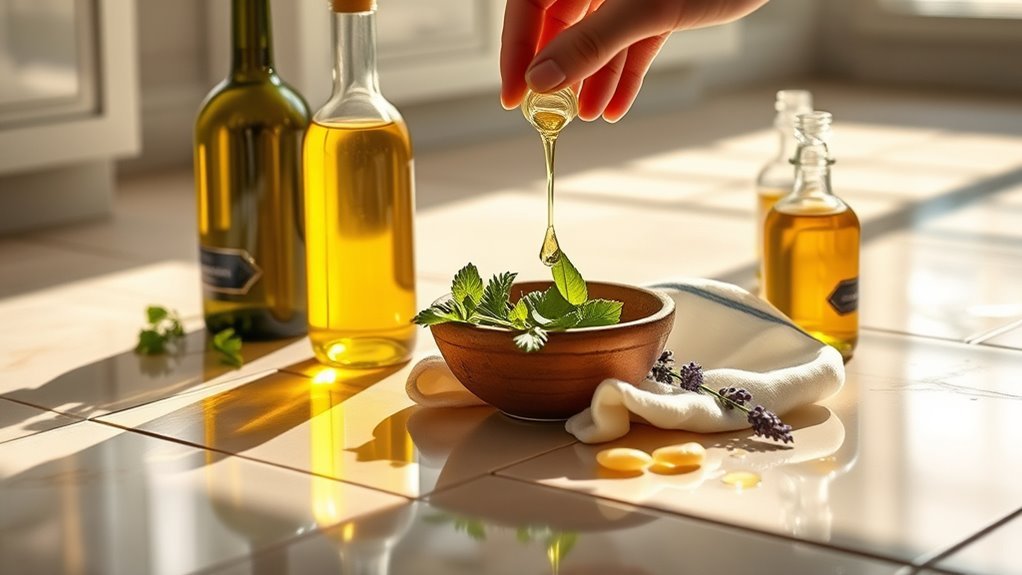
You can use olive oil to give your tile a natural, lasting shine while protecting the surface. Pair it with essential oils like lemon or tea tree to add a fresh scent and extra cleaning power. Applying a small amount with a soft cloth and buffing gently will bring out the best polish and shine.
Benefits of Olive Oil
A touch of natural brilliance can transform your tile’s appearance, and olive oil offers just that. When you use olive oil for tile maintenance, you’re choosing a simple, eco-friendly way to restore shine without harsh chemicals. It nourishes and protects your tiles, leaving a subtle gleam that feels fresh and inviting.
Here’s why olive oil’s a great pick for your tile care routine:
- Enhances shine naturally without synthetic additives
- Creates a protective layer that repels dirt and grime
- Easy to apply and safe for most tile types
With olive oil, you gain freedom from chemical cleaners while keeping your tiles looking vibrant and polished. It’s a small step that makes a big difference in maintaining your home’s natural beauty.
Choosing Essential Oils
Although olive oil alone does wonders for your tiles, combining it with essential oils can elevate the shine and add invigorating scents that make cleaning feel less like a chore. When choosing essential oils, consider their aroma profiles to match your mood and space—citrus oils like lemon or orange bring fresh energy, while lavender or eucalyptus offer calming vibes. Experimenting with oil combinations lets you create a personalized blend that not only enhances your tiles’ gloss but also fills your home with freedom-inspiring scents. Just a few drops mixed with olive oil can transform your cleaning routine into a rejuvenating ritual. Embrace the power of nature’s fragrances and make your tiles gleam with a scent that speaks to your soul.
Application Techniques for Shine
When applying olive oil mixed with essential oils for tile shine, it’s important to use the right techniques to avoid streaks or residue. Mastering these polishing techniques guarantees your tiles get a smooth, natural finish that enhances their beauty without harsh chemicals. Here’s how to do it:
- Use a soft, lint-free cloth for even application and to prevent scratches.
- Apply the mixture sparingly; a little goes a long way in achieving that natural finish.
- Work in small sections, buffing gently in circular motions to evenly distribute the oils and boost shine.
Steam Cleaning for Chemical-Free Tile Maintenance
Since steam uses only water heated to high temperatures, it offers a powerful way to clean your tile without chemicals. You’ll appreciate the steam cleaning benefits: it kills germs, loosens dirt, and refreshes grout, all while being eco-friendly. To get the best results, master a few steam cleaning techniques. Move the steam cleaner slowly over your tile to let the heat penetrate grime. Use a microfiber cloth attachment to capture loosened dirt effectively. Steam cleaning frees you from harsh cleaners, giving you a natural, safe way to maintain your tile’s beauty. Plus, it’s quick and reduces the need for scrubbing. Embracing steam means you’re choosing a method that respects your space and the environment, letting your tiles shine with minimal effort.
Castile Soap as a Gentle Tile Cleaner
One simple ingredient you can rely on for gentle tile cleaning is Castile soap. Its natural, plant-based formula offers impressive castile soap benefits, making it perfect for those who want effective yet gentle cleaning without harsh chemicals. You’ll love how it respects your freedom to choose non-toxic options while keeping your tiles spotless.
Castile soap offers a natural, gentle, and effective way to clean tiles without harsh chemicals.
To use it effectively:
- Mix a few drops with warm water for a mild, all-purpose tile cleaner
- Apply with a soft cloth or mop to avoid scratching
- Rinse thoroughly to prevent residue buildup
This approach guarantees your tiles stay clean and fresh while you enjoy peace of mind knowing you’ve chosen a safe, eco-friendly solution. Castile soap truly delivers a gentle yet powerful clean.
Preventing Mold and Mildew With Natural Solutions
Although mold and mildew can quickly damage your tiles and grout, you don’t have to rely on harsh chemicals to keep them at bay. You can embrace natural solutions for effective mold prevention and mildew resistance. Start by ensuring proper ventilation in your bathroom or kitchen—fresh air discourages moisture buildup, which mold loves. Use a mixture of white vinegar and water as a spray to naturally inhibit mold growth without toxic residues. Baking soda sprinkled on grout areas can also enhance mildew resistance by absorbing moisture and scrubbing away spores. Routine cleaning with these simple ingredients helps maintain your tiles’ integrity while freeing you from harsh chemicals. With these natural hacks, you’re in control of a healthy, mold-free space that supports your freedom to live chemical-free.
Frequently Asked Questions
Can Natural Cleaners Damage Certain Types of Tile?
Imagine using a rotary phone to call a modern-day plumber—some things just don’t mix, right? When it comes to tile types, not all natural cleaners play nice with every surface. You’ve got to check cleaner compatibility carefully; acidic solutions like vinegar can etch marble or limestone tiles, while others might be fine on ceramic or porcelain. So, you’ll want to choose cleaners that respect your tile’s unique nature to keep your freedom of choice intact.
How Often Should I Deep Clean My Tile Naturally?
You should follow frequency guidelines that suit your lifestyle and tile type when setting your cleaning schedule. Generally, deep cleaning every one to three months works well, but if you live a busy, active life or have kids and pets, you might want to do it more often. Trust your intuition—if your tiles start looking dull or dirty, it’s time to jump in and refresh them naturally.
Are Natural Cleaning Hacks Safe for Pets and Children?
You’ll love that pet friendly ingredients and child safe solutions give you peace of mind while keeping your home fresh. Natural cleaning hacks often use things like vinegar, baking soda, and lemon — all safe around kids and pets when used properly. Just avoid essential oils or anything too strong, and keep your furry friends and little ones away during cleaning. This way, you can enjoy a clean space without worrying about their safety.
Can Natural Cleaners Remove Tough Stains Like Rust or Oil?
Think of tough stains like rust or oil as stubborn knots in a rope—you’ll need the right technique to unravel them. You can tackle rust removal with natural ingredients like lemon juice and baking soda, which gently break down the stain without harsh chemicals. For oil stains, try a paste of baking soda and vinegar to lift the grease. These natural methods give you the freedom to clean effectively while staying eco-friendly and safe.
What Is the Best Natural Cleaner for Outdoor Tile?
When it comes to cleaning your outdoor tile, you’ll want natural cleaning solutions that work tough but stay gentle. A mix of white vinegar and water is perfect for cutting through grime without harsh chemicals. For stubborn dirt, sprinkle baking soda first, then spray vinegar—let it fizz before scrubbing. These simple ingredients give you freedom from toxins while keeping your outdoor tile fresh and inviting.
